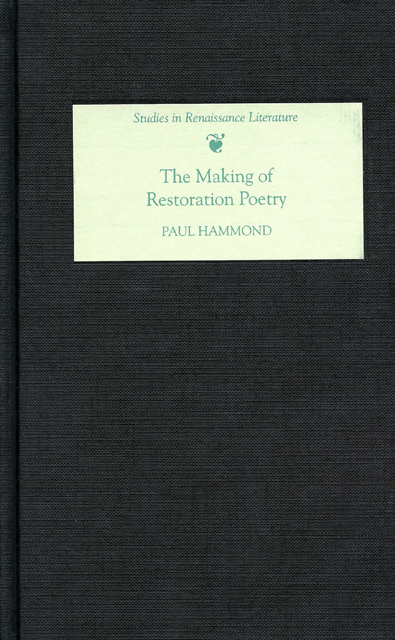4 - Intertextuality in Restoration Poetry
Published online by Cambridge University Press: 18 March 2023
Summary
ALL POETRY in some degree works intertextually, aware if only implicitly of the traditions within which it locates itself, using a vocabulary which is shaped by its predecessors and shared by its contemporaries; but the poetry of the Restoration is self-conscious and self-referential to an unusual degree. There are several reasons for this. The political upheavals of the period were profound, for the thirty years from 1658 to 1688 brought the death of England's first republican ruler, the restoration of the monarchy, an attempt to change the hereditary principle of succession, the accession of a Catholic king who was widely seen as a threat to his people's liberties, the deposing of that king, and the installation of new joint sovereigns chosen by the ruling elite to legitimize a peaceful conquest. All these political changes were debated in the public press, in prose pamphlets and in verse; therefore the vocabulary through which the nation argued over its political culture was subject to repeated revision: words such as ‘arbitrary’, ‘liberty’, ‘patriot’, ‘prerogative’, ‘Protestant’, ‘tyranny’, ‘usurper’, became counters which were used and reused. Within the textual communities formed by the circulation of letters, pamphlets, newspapers, and verses, there emerged an acute consciousness of the semantic field of such terms, and their emotive charge. In the literary world, too, an exchange of prologues, epilogues, satires, verse letters, critical essays, prefaces, and dedications created a self-aware literary milieu, often centred around the playhouses, and intersecting with the partisan world of politics in unpredictable and shifting ways. When Dryden's literary satire Mac Flecknoe, for instance, was put into print by an opportunistic pirate in 1682, six years after it had first circulated in manuscript, it was given the subtitle ‘A Satyr upon the True-Blew-Protestant Poet, T. S. By the Author of Absalom & Achitophel’, in order to make it appear to be another contribution by Dryden to the debate over Exclusion. Parody and rejoinder are common Restoration genres: Absalom and Achitophel attracted eight full-length responses, many attempting to deploy the rhetoric of Dryden's poem against him; and The Medal similarly generated four replies. Dryden's Mac Flecknoe is an intricate web of allusions to the works of Shadwell and Flecknoe, and also draws upon Virgil, Cowley, Davenant, Waller, and Milton for the vocabulary of empire in order to establish a mock-heroic empire of dullness.
- Type
- Chapter
- Information
- The Making of Restoration Poetry , pp. 73 - 88Publisher: Boydell & BrewerPrint publication year: 2006
- 1
- Cited by



